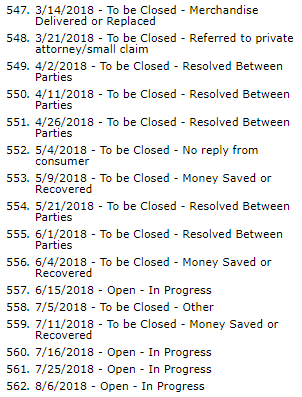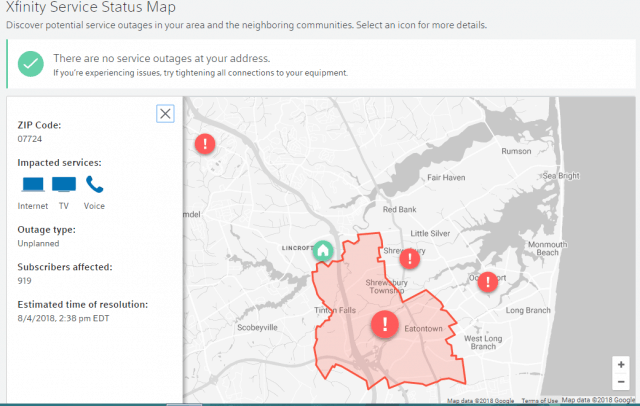 Frustrated New Englanders that can’t get anywhere dealing with Comcast or Consolidated Communications’ customer service are getting fast fixes in New Hampshire by taking their complaints to the Consumer Protection and Antitrust Division of the attorney general’s office.
Frustrated New Englanders that can’t get anywhere dealing with Comcast or Consolidated Communications’ customer service are getting fast fixes in New Hampshire by taking their complaints to the Consumer Protection and Antitrust Division of the attorney general’s office.
Jim Boffetti, in charge of that division, says his office receives 4,000 written complaints and 7,000 calls a year about consumer issues, a not insubstantial number from residents upset with their local cable and phone company.
New Hampshire is dominated by Comcast for cable service and Consolidated Communications for telephone service. Boffetti told The Laconia Daily Sun the two companies are familiar to staffers, responsible for more than 250 complaints for the phone company since Consolidated took over for FairPoint last year and 561 “racked up by Comcast” since 2009. Boffetti’s theory of how these companies handle consumer complaints is partly based on wearing customers down.
“The hassle factor is enormous,” he said. “It’s just the way these people do business.”
Boffetti doesn’t believe the number of complaints is unusual either, “considering the business that they’re in.”

Boffetti
Although the New Hampshire regulator cannot usually intervene to set prices, change conduct, or force resolutions, most telecommunications companies fear riling up state or federal regulators. Those government officials can potentially return “the favor” of years of arrogance and condescension when a company needs state or federal approval of a merger or permitting issue.
Only a small percentage of consumers realize they can file complaints with private groups like the Better Business Bureau, state officials like an attorney general or telecommunications/utility regulator, and federal agencies like the FCC. In every case, companies assign their best representatives to handle those complaints in an effort to protect their reputation.
When consumers file complaints with the New Hampshire attorney general’s office, the office forwards them to a designated person or department at the provider. Comcast and Consolidated assign senior level customer service departments to specifically handle these types of complaints. The representatives are given wide latitude to settle problems quickly and quietly — often refunding large sums of money, extending generous service credits, resolving ongoing service problems, or waiving service fees that ordinary customer service representatives insist cannot be done. Most of the time, complaints are settled in the customer’s favor.
“Usually it all gets worked out,” Boffetti said. “They’re pretty responsive to the complaints. They make an attempt to resolve it.”
When Karen Jacobs was offered a better deal by Consolidated Communications, she jumped at the opportunity to get cheaper and faster internet access for her home in Moultonborough. What originally cost her $104 a month was supposed to be $74 after she was sold an improved bundled service package. On the installation date, nobody from Consolidated showed up. Instead, she was told her order ‘was stuck’ in the system. To get it ‘unstuck,’ Jacobs would ‘have to pay a $300 one-time fee,’ something never mentioned by the original representative.

Complaints against Comcast are usually resolved in the customer’s favor, as this report from the New Hampshire attorney general’s office shows.
Jacobs asked the representative to waive the fee because it was never mentioned. The representative refused, and even lectured Jacobs about how little Consolidated was regulated by the state government and could do as it pleased.
“He didn’t care,” she said of one particular representative. “It was like, ‘Too bad.’”
Despite claims the $300 fee was “company policy,” it was news to Jacobs.
“That was never, ever, ever, ever discussed anywhere in the conversation,” she said. “It’s lousy.”
Jacobs had not yet filed a formal complaint, taking her story to the media instead. But similar complaints of hidden/surprise installation and activation fees are very common, and once forwarded by a regulator, are usually resolved by either waiving or refunding the charges.
Customers are gratified they get to keep their money, but remain annoyed at companies who “forget” to disclose important terms and conditions like fees as they try to seal the deal.
Customers can Google their own state’s attorney general and by searching for consumer complaints, can usually file their own complaint online in just a few minutes. In New Hampshire, residents can file a complaint on the website or mail it.
New England residents can also reach out directly to Comcast or Consolidated’s special consumer complaints departments directly by mail:
COMCAST – NEW ENGLAND
Executive Customer Care and Communications
Post Office Box 6505
Chelmsford, MA 01824-0905
CONSOLIDATED COMMUNICATIONS OF NEW HAMPSHIRE, VERMONT, AND MAINE
State Regulatory Matters
800 Hinesburg Road
South Burlington, VT 05403
Comcast provides cable service throughout northern New England and Massachusetts. Consolidated Communications provides landline service predominately in New Hampshire, Vermont, and Maine.
The New Hampshire attorney general’s consumer protection hotline is 1-888-468-4454 or (603) 271-3641, weekdays from 9 a.m. to 3 p.m. You can also contact them by email at: [email protected]
 New York regulators have given Charter Communications two additional weeks to submit its plan to discontinue service in the state after the Commission voted 4-0 in July to de-certify its merger with Time Warner Cable.
New York regulators have given Charter Communications two additional weeks to submit its plan to discontinue service in the state after the Commission voted 4-0 in July to de-certify its merger with Time Warner Cable.

 Subscribe
Subscribe Comcast announced this week it is expanding its $9.95 discount internet access program Internet Essentials to
Comcast announced this week it is expanding its $9.95 discount internet access program Internet Essentials to  Qualified Assistance Programs
Qualified Assistance Programs In the seven years of its existence, Comcast has only managed to enroll six million people in the program, a fraction of those that would otherwise qualify who live in Comcast service areas. Most critics blame Comcast’s onerous qualification requirements for the relatively low enrollment.
In the seven years of its existence, Comcast has only managed to enroll six million people in the program, a fraction of those that would otherwise qualify who live in Comcast service areas. Most critics blame Comcast’s onerous qualification requirements for the relatively low enrollment. Nearly half of all adults with an income below $30,000 don’t have home broadband service or a traditional computer, a 2017
Nearly half of all adults with an income below $30,000 don’t have home broadband service or a traditional computer, a 2017
 Frustrated New Englanders that can’t get anywhere dealing with Comcast or Consolidated Communications’ customer service are getting fast fixes in New Hampshire by taking their complaints to the Consumer Protection and Antitrust Division of the attorney general’s office.
Frustrated New Englanders that can’t get anywhere dealing with Comcast or Consolidated Communications’ customer service are getting fast fixes in New Hampshire by taking their complaints to the Consumer Protection and Antitrust Division of the attorney general’s office.


